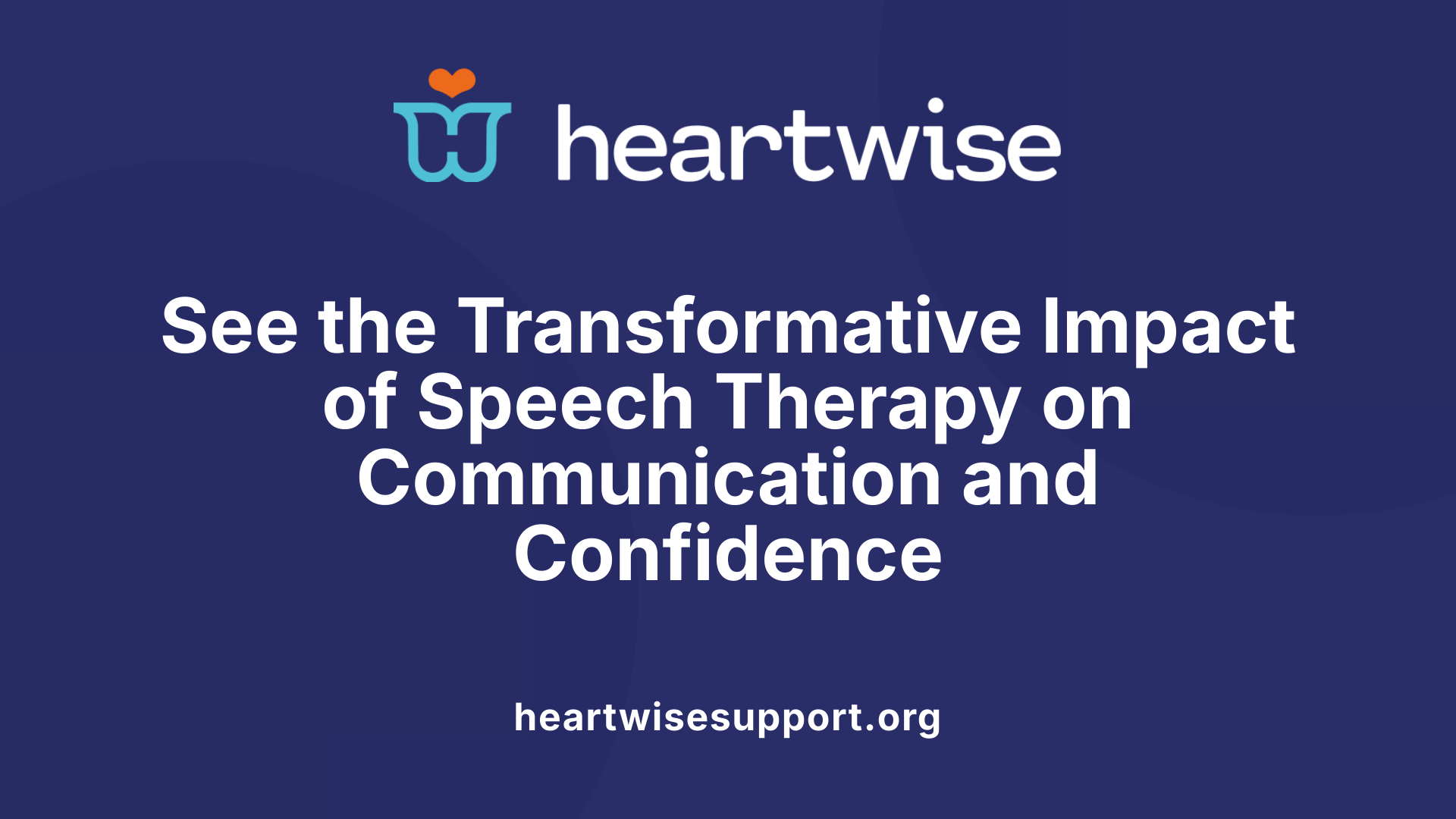Unlocking Potential with Speech Therapy
Speech therapy plays a vital role in helping individuals of all ages overcome communication challenges, improving their ability to express thoughts, understand others, and participate actively in daily life. As a specialized healthcare service, it offers tailored interventions that foster confidence, independence, and social inclusion, ultimately enhancing quality of life.
Understanding Speech Therapy and Its Objectives

What is speech therapy?
Speech therapy, also known as speech-language pathology, is a specialized healthcare service focused on improving communication, speech, and swallowing skills. It involves working with trained speech-language pathologists (SLPs) to evaluate, diagnose, and treat a variety of speech and language disorders across all age groups—from infants to the elderly.
Therapists develop personalized treatment plans that include exercises, activities, and strategies tailored to each individual’s needs. These may involve pronunciation drills, language development activities, voice modulation practice, and use of assistive communication devices. The ultimate goal of speech therapy is to help individuals express themselves more clearly, understand others better, and participate actively in social, educational, or workplace environments.
Common conditions treated include speech sound disorders like articulation issues, fluency problems such as stuttering, voice disorders, language delays, cognitive-communication issues after neurological injuries, aphasia, and swallowing difficulties. Through effective therapy, many individuals experience increased confidence, independence, and overall quality of life.
Why is speech important in communication?
Speech forms the foundation of effective communication. It enables individuals to convey their thoughts, needs, emotions, and ideas clearly and confidently. Well-developed speech skills foster better social interactions, relationships, and community participation.
Using speech effectively involves more than just pronunciation. Elements like tone, pitch, volume, and pacing help convey meaning and emotion. Non-verbal cues such as gestures and facial expressions complement spoken words to enrich communication.
Public speaking skills and active listening practices, such as maintaining eye contact and using appropriate gestures, enhance clarity and engagement. Speech also plays a vital role in building credibility, persuading others, and expressing feelings, making it an essential skill for personal and professional development.
What is the main role of a speech and language therapist?
A speech and language therapist’s primary role is to improve individuals' ability to communicate and swallow effectively. They assess each person’s strengths and challenges through comprehensive evaluations.
Based on their assessment, SLPs design targeted intervention programs that may include speech exercises, language enrichment activities, and cognitive-communication training. They also support clients’ families and caregivers by teaching strategies for reinforcing skills at home or in community settings.
SLPs use various tools like picture boards, communication books, or speech-generating devices to assist those with non-verbal communication needs. They work in diverse settings: hospitals, schools, clinics, and community centers, always aiming to maximize each individual’s potential.
Their work not only improves speech clarity and language skills but also boosts self-esteem, independence, and social participation, ultimately enhancing the overall quality of life.
Common disorders treated with speech therapy
| Disorder Type | Description | Typical Treatment Strategies |
|---|---|---|
| Articulation Disorders | Difficulties pronouncing sounds correctly. | Mouth exercises, speech drills, phoneme practice. |
| Fluency Disorders | Challenges with speech flow, such as stuttering. | Controlled breathing, relaxation techniques, speech pacing. |
| Voice Disorders | Problems with pitch, volume, or voice quality. | Voice therapy, breathing exercises, vocal hygiene education. |
| Language Development Delays | Lag in vocabulary, grammar, or understanding. | Language enrichment activities, storytelling, reading aloud. |
| Cognitive-Communication Issues | Difficulties with attention, memory, problem-solving. | Cognitive exercises, problem-solving tasks, activity adaptations. |
| Swallowing Disorders (Dysphagia) | Challenges with safe swallowing. | Swallowing assessments, food texture modifications, exercises. |
How therapy is tailored and its duration
Therapy duration varies based on individual needs, age, and disorder severity. Early intervention in children can lead to more rapid progress and better academic and social outcomes.
Personalized treatment plans include specific activities such as tongue and mouth exercises, facial movements, reading aloud, and word games. The approach evolves with ongoing assessments.
In adults, therapy may focus on recovery from neurological injuries, like stroke or traumatic brain injury, or managing chronic conditions such as multiple sclerosis. Overall, continuous evaluation ensures optimal outcomes.
The future of speech therapy
Advances in technology, including teletherapy and computer-based exercises, have expanded access and improved treatment options. Artificial intelligence and innovative communication devices are opening new possibilities for individuals with complex needs.
Raising awareness about communication disorders promotes early detection and reduces stigma. Ongoing research aims to build stronger evidence for therapy methods, especially for conditions like cerebral palsy.
In summary, speech therapy plays a vital role in helping people unlock their communication potential, fostering connections, and enriching lives through tailored interventions and supportive strategies.
Strategies and Techniques in Speech Therapy

How does speech therapy improve communication skills?
Speech therapy enhances communication by helping individuals understand and convey their thoughts effectively. Through tailored exercises and techniques, clients learn how to articulate words clearly, develop better listening skills, and interact assertively. This process often involves practicing active listening, maintaining eye contact, and interpreting social cues to foster healthier dialogue.
Therapists work to reduce emotional and behavioral barriers that may hinder effective communication. By creating a supportive environment, individuals gain confidence to express themselves, practice new social skills, and respond appropriately during interactions.
For example, clients learn to ask open-ended questions or use non-verbal cues, which can strengthen personal relationships and improve mental well-being. Overall, speech therapy promotes healthier interactions, helping individuals communicate their feelings clearly and build stronger social bonds.
What methods and strategies are used in speech therapy to enhance communication?
Speech therapy uses a wide array of approaches to address different communication challenges. Among these, articulation therapy focuses on strengthening oral muscles, practicing speech sounds, and breath control. Techniques like tongue twisters, singing, and various games are employed to promote clarity and accuracy in speech.
Fluency strategies include controlled breathing and relaxation techniques that aid individuals with stuttering, boosting their confidence with speaking.
Language enrichment involves engaging in activities such as reading aloud and storytelling. These help expand vocabulary, enhance grammar, and improve understanding.
In addition, visual, tactile, and communication aids play a vital role. Picture boards, communication books, and speech-generating devices give individuals alternative ways to express themselves, increasing their independence.
Activities like interactive games and speech exercises are customized to suit individual needs, often involving parent or caregiver participation for reinforcement at home.
Therapists also incorporate oral motor exercises to improve muscle control and coordination, essential for clear speech.
All these strategies, tailored by a licensed speech-language pathologist, ensure effective intervention tailored to each person's unique communication profile.
Types of activities used in speech therapy
Activities in speech therapy are designed to support learning in a fun and engaging way. These include:
- Tongue and mouth exercises to strengthen muscles.
- Facial movement activities to improve expressions.
- Reading aloud to enhance fluency and vocabulary.
- Word games that promote language development.
- Interactive storytelling and role-playing to boost pragmatic language skills.
Using visual aids, like picture cards, helps reinforce learning and communication cues.
Incorporating technology, such as speech apps and digital devices, also expands options for therapy.
These activities are part of comprehensive therapy plans focused on building communication skills efficiently and enjoyably.
Visual Summary
| Method/Technique | Description | Common Uses |
|---|---|---|
| Articulation Therapy | Strengthening speech sounds and oral muscles | Speech sound errors, pronunciation |
| Fluency Techniques | Controlled breathing and relaxation to reduce stuttering | Fluency disorders |
| Language Enrichment | Reading, storytelling, vocabulary expansion | Language delays, academic support |
| Communication Aids | Visuals, speech devices, alternative communication tools | Non-verbal and complex communication |
| Oral Motor Exercises | Muscle strengthening for speech articulation | Speech clarity, muscle control |
By integrating these approaches, speech therapy can significantly improve communication skills, fostering confidence and independence in individuals of all ages.
Benefits of Speech Therapy for Various Populations

How does a speech and language therapist help a child?
A speech and language therapist plays a vital role in enhancing children's communication skills. They assess various speech, language, and swallowing difficulties and develop personalized treatment plans. Through engaging activities such as exercises, play, and targeted strategies, therapists help children produce clear speech, expand their vocabulary, improve comprehension, and use language confidently in social settings.
Therapists address specific issues like stuttering, pronunciation errors, or delays in speech development. Early intervention can yield significant positive outcomes, although speech therapy is beneficial at any age. By supporting children in overcoming communication hurdles, therapists foster independence, boost confidence, and enhance educational performance.
Overall, speech therapists are instrumental in helping children communicate more effectively, which is fundamental for social interaction, learning, and personal growth.
Impact and Outcomes of Speech Therapy

How does speech therapy improve communication skills?
Speech therapy plays a vital role in enhancing communication by targeting both expressive and receptive language abilities. It helps individuals learn to articulate their thoughts more clearly and understand others better. Practicing speech sounds, improving voice control, and expanding vocabulary are some techniques used to refine speech clarity and fluency.
Active listening is another focus, where individuals are taught to maintain eye contact, use non-verbal cues, and interpret social cues effectively. These skills foster richer social interactions and reduce communication barriers. For instance, clients learn to ask open-ended questions and respond appropriately, which strengthens social bonds.
Therapeutic environments provide safe spaces where individuals can practice these new skills without fear of judgment. Consistent work with licensed speech-language pathologists ensures tailored interventions that directly address specific challenges.
Targeted exercises such as tongue and mouth movements, reading aloud, and social communication drills further support progress. As a result, many clients experience improved ability to express their feelings, convey needs, and engage confidently in conversations.
Overall, speech therapy cultivates healthier communication patterns, positively influencing personal relationships, mental health, and social success.
What are the overall benefits of speech therapy?
Beyond mere speech clarity, the advantages of speech therapy encompass a broad spectrum of personal development. Individuals experience boosted self-esteem as they become more capable of expressing themselves effectively.
Independence in daily activities is enhanced, especially when communication barriers are reduced. This independence is crucial for children gaining confidence in classroom settings and adults navigating workplaces or social environments.
Social skills improvement often results from the ability to participate actively in conversations, understand social cues, and build better relationships. Academic performance can also benefit, particularly for children with language delays or learning disorders.
Therapy also facilitates pursuing personal interests and professional goals by reducing communication anxieties and increasing participation. For many, this translates to an improved quality of life, greater community involvement, and increased self-sufficiency.
The personalized nature of treatment ensures that interventions are relevant and impactful, addressing individual needs and circumstances. Consequently, individuals enjoy not just better speech, but also a more satisfying and connected life.
Long-term benefits of speech therapy
Engaging in speech therapy can lead to enduring positive effects. Early intervention in children lays a strong foundation for ongoing educational success and social development.
In adults, improvements in communication can support career advancement, enhance social relationships, and bolster mental health. Many individuals report sustained confidence and independence long after therapy concludes.
Advancements in technology, like computer-based exercises and teletherapy, continue to improve accessibility and outcomes. These tools allow consistent practice, reinforcement, and remote support, extending the reach of effective treatment.
Furthermore, increased awareness and education about communication disorders help reduce stigma and promote early help-seeking behaviors. Over time, this fosters a more inclusive society where all individuals can thrive.
In summary, the benefits of speech therapy ripple across various aspects of life, supporting individuals in achieving their full potential, maintaining well-being, and fostering meaningful connections with others.
| Aspect | Details | Additional Notes |
|---|---|---|
| Communication Improvement | Enhanced clarity, fluency, understanding | Focus on speech sounds, vocabulary, social cues |
| Confidence & Independence | Greater self-esteem, reduced anxiety | Facilitates social participation, daily activities |
| Academic & Professional | Better classroom engagement, workplace performance | Supports learning and career goals |
| Social & Emotional | Improved relationships, emotional well-being | Develops pragmatic skills, emotional expression |
| Long-term Impact | Sustained benefits over time | Early intervention and ongoing support crucial |
These comprehensive benefits underscore the value of speech therapy as a vital service for individuals across all ages, helping them communicate more effectively, confidently, and independently.
Empowering Individuals Through Communication
Speech therapy is a proven, effective approach to overcoming a wide range of communication challenges. By assessing individual needs and employing targeted strategies, speech-language pathologists help clients improve their speech, language, and social skills. The resultant increased confidence, independence, and better social interactions highlight the transformative power of communication. As awareness grows and technological advancements expand access to services, the future of speech therapy promises even greater outcomes, making it an indispensable tool for communication development and rehabilitation.
References
- Speech Therapy: What It Is & How It Works
- Speech Therapy Strategies to Help Improve Communication
- Speech and language therapy to improve the communication skills ...
- Unveiling the Power of Speech Therapy: A Journey to Improved ...
- Unlocking Communication: The Importance of Speech Therapy
- The Importance of Speech Therapy: How It Makes a Difference
- The Role of Speech Therapy in Enhancing Communication Skills of ...
- Speech-Language Pathologists - Job Description and Career ...
- Speech Therapy: What It Is & How It Works
- Speech-Language Pathologists : Occupational Outlook Handbook











